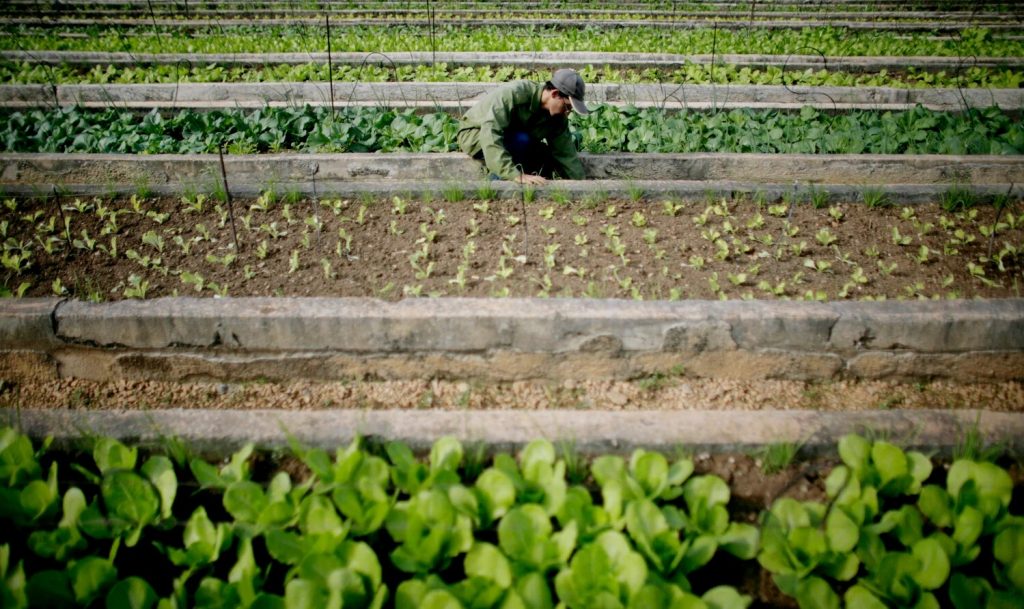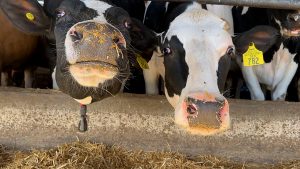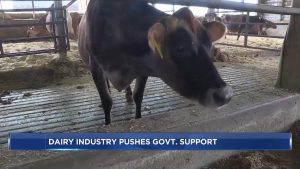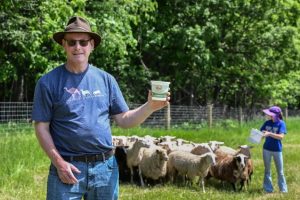
If you or someone you know is struggling, call or text the National Suicide and Crisis Lifeline at 988.
May is Mental Health Month, and we’re putting the spotlight on one group that’s especially vulnerable: farmers.
According to the National Rural Health Association, farmers are three and a half times more likely to die by suicide than the general population.
A statewide non-profit says farmers’ mental health is deeply tied to the health of their businesses.
Adam Howell, outreach director for New York FarmNet, said it sends out social workers and business experts to farms together.
“They go together as a team. For free, they help farmers develop a plan to address almost any type of problem, any type of opportunity, or any type of transition that may be happening on the farm,” he said.
So much about farming is out of their control: the weather, prices for crops and milk, economic fluctuation, and when animals get sick or hurt, Howell said.
Howell spoke with Northern Light co-host Catherine Wheeler about how all that stress adds up.
Their conversation has been lightly edited for length and clarity.
ADAM HOWELL: There’s a lot of “gambling” that goes into farming, where at the end of the day, a really bad year can have a serious impact on the business. Now, why I started with the business instead of just the mental/social issues, is because when it comes to farming, the two are intertwined. Their home is their business. Their life is the farm. So it’s very, very hard to untether the stresses of farming from the personal mental health of the farmer. That’s why we see mental health being such a larger issue for farmers than in other areas. Crops, animals, they need to be taken care of no matter what, whether it’s a holiday, whether a farmer’s ill, or whether a farmer has something else going on in their lives. So, it’s a constant struggle for people on farms.
Finally, farms are located in rural areas. Rural areas are isolated, isolated from services in terms of mental health, and they’re isolated from other people. It can be a lonely job sometimes. So, all of these intertwining factors come together to make it very challenging overall in terms of mental health.
CATHERINE WHEELER: I’m wondering right now, there is a lot of uncertainty in the industry, especially financially. There are concerns about tariffs and the trade wars, as well as cuts to federal programs and uncertainty about whether farmers are going to get money back from the federal government that they’ve already spent. Is this a particularly difficult time for farmers right now? What are you hearing?
HOWELL: We are hearing not only the acute financial strain that are that is occurring from some of the things you mentioned—tariffs, the cutting of government programs, the suspending of things like USDA grants and such, changing standards for FSA loans, but also farmers are not sure about about what to expect down the line.
Another area is labor, H2A labor. There’s uncertainty about being able to, especially with regards to the dairy industry, but really any other labor-intensive sector. People are unsure whether there’s going to be the labor force available, which oftentimes comes from immigrants, in the future to sustain farm production in New York State. But yeah, we are hearing that stress is elevated. We are hearing that there is concern now, but also worry about what’s going to happen down the line because things are changing so quickly.
WHEELER: Yes, and with the stress, earlier you mentioned the isolation of farmers in rural areas can be a factor in them receiving care. I was wondering if you could identify other barriers to farmers getting help for mental health challenges?
HOWELL: We find that culturally, farmers are much more reluctant to seek help in many cases because the areas that they live in, they’re well known amongst the community. Small towns have very few secrets, and if farmers are seen going to a therapist’s office, they’re seen going to a county mental health facility. They’re oftentimes very worried about what people will think. Farmers, culturally, are much more private, which is why our program is a come-to-the-farmer program. We actually like to say that the best solutions are found at the kitchen table. That’s why farmers open up to us so much because we go to the farm. We don’t make the farmer come to a public place or a public office. But cultural issues are also a barrier to services, regardless of whether they’re available or not.
WHEELER: Our culture in the U.S. has changed in the past few decades—people are more open to speaking up about their mental health challenges. How do you get this group of people to do this, or utilize services that can help them?
HOWELL: Just to get people to open up is always a challenge, but I’m glad you brought it up because we are seeing somewhat of a sea change even in agriculture.
While the average age of an active farmer is increasing, we are seeing new generations take hold and thanks to things, whether it’s social media, bringing more people together to talk about their stories, or just just the fact that there are more services opening up in rural areas, we are seeing farmers more likely to avail themselves of mental health services today than they have been in the past.
Another thing that we see that’s very effective is the storytelling element of what we do. We have found many of our former clients have been willing to tell their story about working with FarmNet or working with mental health service providers, and that explanation publicly is starting to make it okay for others to come forward.
You can now read the most important #news on #eDairyNews #Whatsapp channels!!!
🇺🇸 eDairy News INGLÊS: https://whatsapp.com/channel/0029VaKsjzGDTkJyIN6hcP1K























